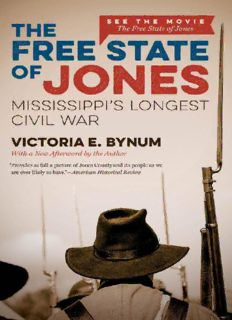
The Free State of Jones, Movie Edition: Mississippi’s Longest Civil War PDF
Preview The Free State of Jones, Movie Edition: Mississippi’s Longest Civil War
The Free State of Jones The Free State of Jones: Mississippi’s Longest Civil War VICTORIA E. BYNUM with a new afterword by the author THE UNIVERSITY OF NORTH CAROLINA PRESS CHAPEL HILL © 2001, 2016 The University of North Carolina Press All rights reserved Manufactured in the United States of America Designed by April Leidig-Higgins Set in Joanna The paper in this book meets the guidelines for permanence and durability of the Committee on Production Guidelines for Book Longevity of the Council on Library Resources. ISBN 978-1-4696-2705-2 (pbk: alk. paper) ISBN 978-1-4696-2706-9 (ebook) The Library of Congress has cataloged the original edition of this book as follows: Bynum, Victoria E. The free state of Jones: Mississippi’s longest civil war / by Victoria E. Bynum. p. cm.—(The Fred W. Morrison series in southern studies) Includes bibliographical references (p.) and index. 1. Jones County (Miss.)—History—19th century. 2. Jones County (Miss.)—Social conditions —19th century. 3. Military deserters—Mississippi—Jones County—History—19th century. 4. Unionists (United States Civil War)—Mississippi—Jones County. 5. Mississippi—History—Civil War, 1861–1865—Social aspects. 6. United States—History—Civil War, 1861–1865—Social aspects. 7. Knight family. 8. Racially mixed people —Mississippi—Jones County—History—19th century. 9. Jones County (Miss.)—Biography. I. Title. II. Series. F347.J6 B95 2001 976.2’55—dc21 2001027040 Portions of this book have been reprinted in revised form with permission from the following works: Victoria E. Bynum, “Misshapen Identity: Memory, Folklore, and the Legend of Rachel Knight,” in Discovering the Women in Slavery: Emancipating Perspectives on the American Past, edited by Patricia Morton (Athens: University of Georgia Press, 1996), © 1996 University of Georgia Press; “Misshapen Identity: Memory, Folklore, and the Legend of Rachel Knight,” in Sex, Love, Race: Crossing Boundaries in North American History, edited by Martha Hodes (New York: New York University Press, 1999); “‘White Negroes’ in Segregated Mississippi: Miscegenation, Racial Identity, and the Law,” Journal of Southern History 64 (May 1998); and “Telling and Retelling the Legend of the Free State of Jones,” in Guerrillas, Unionists, and Violence on the Confederate Home Front, edited by Daniel Sutherland (Fayetteville: University of Arkansas Press, 1999). stated with a grant Figure Foundation civil may we rest To the memory of my father, Oma Stanley Bynum. Now I understand Contents Acknowledgments Timeline: The Free State of Jones Preface Introduction. Sacred Wars: Race and the Ongoing Battle over the Free State of Jones Part One. The Origins of Mississippi’s Piney Woods People 1 Jones County’s Carolina Connection: Class and Race in Revolutionary America 2 The Quest for Land: Yeoman Republicans on the Southwestern Frontier 3 Piney Woods Patriarchs: Class Relations and the Growth of Slavery 4 Antebellum Life on the Leaf River: Gender, Violence, and Religious Strife Part Two. Civil War, Reconstruction, and the Struggle for Power 5 The Inner Civil War: Birth of the Free State of Jones 6 The Free State Turned Upside Down: Colonel Lowry’s Confederate Raid on Jones County 7 Reconstruction and Redemption: The Politics of Race, Class, and Manhood in Jones County 8 Defiance and Domination: “White Negroes” in the Piney Woods New South Epilogue. The Free State of Jones Revisited: Davis Knight’s Miscegenation Trial Afterword Appendixes 1 Selected Descendants of the Knight Family 2 Selected Descendants of the Coleman Family 3 Selected Descendants of the Welborn Family 4 Selected Descendants of the Bynum Family 5 Selected Descendants of the Collins Family 6 Selected Descendants of the Sumrall Family 7 Selected Descendants of the Welch Family 8 Selected Descendants of the Valentine Family 9 The “White Negro” Community, 1880–1920 Notes Bibliography Index Illustrations, Maps, and Tables Illustrations James O. Reddoch and grandsons, ca. 1908 102 Amos Deason Home, Ellisville, Mississippi 107 Leaf River, intersection of Covington and Jones Counties 108 Rachel Knight 111 Newton Knight 134 Prentice M. Bynum, ca. 1895 141 Rachel Knight and Newton Knight, before 1889 146 Serena Knight and Newton Knight 154 Grace Knight, Lessie Knight, and Georgeanne Knight, ca. 1905 155 Family of Jeffrey Early Knight and Martha Ann Eliza “Molly” Knight, ca. 1915 156 John Madison “Hinchie” Knight, ca. 1900 160 Family of George “Clean Neck” Knight and Elmyra Turner Knight, ca. 1900 162 Knight School, Gitano, Mississippi, ca. 1908 164 Grace Knight, ca. 1908 165 Stewart Knight 166 Oree Knight and Eddress Booth Knight, ca. 1929 167 Florence Knight Blaylock holding grandson, 1999 168 Dock Howze and Fannie Knight Howze, ca. 1905 169 George Monroe Knight and William Gailie Knight, ca. 1910 169 Martha Ann Eliza “Molly” Knight, ca. 1915 170 Chances Omar Knight, ca. 1915 170 Serena Knight, ca. 1920 171 Rachel Dorothy Knight, ca. 1920 172 Ardella Knight Barrett, ca. 1930 173 Rachel Watts, 1935 174 Augusta Ann Knight Watts, with Ezra Watts and Rachel Watts, ca. 1930 175
Description: